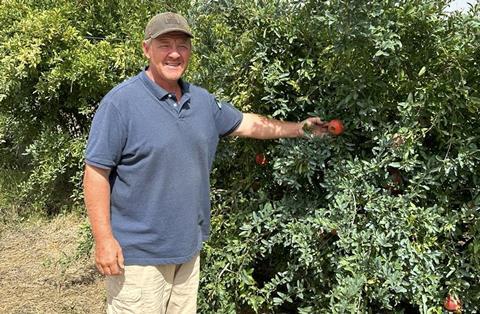Pomegranate exports from South Africa will benefit from confidence in the industry as they look to recover from last year’s dip in production
South Africa’s pomegranate industry has a good future, but there are also some challenges that the business needs to overcome in order to make an impact on export markets.
This was the verdict of Kai Ulsan, chairman of the South African Pomegranate Association, and grower in the lower Berg River Valley in the Western Cape.

“After the 2022 season where we exported slightly more than 1.2m cartons, the volume dropped back to around 900,000 cartons last year,” said Ulsan. “We hope to reach the million mark again this year and if we can improve in various areas there is a good future ahead.”
Issues that have been concerning growers included recent hot summers, which contributed to sunburn and lack of colour development, as well as better information systems which should help the industry plan better.
Around 30 per cent of the export crop is shipped as Class One fruit and the rest falls into the processing category.
Some of the processed fruit is eventually juiced but a good percentage is sold in special packs after the arils have been separated.
“Part of the category is also sold as whole fruit in the Middle East, which is emerging as one of our most important markets,” Ulsan continued.
During 2023 nearly 80 per cent of South Africa’s pomegranates were sold in Africa, 6 per cent in Asia and 6 per cent in the Middle East.
The UK, with just under 2 per cent and the European Union with just over 1 per cent were other markets.
Jaco Rheeder, from leading exporter Star South, said South Africa had a track record of producing some of the best internal quality in pomegranates in the world.
“We are entering the market just after Turkey finishes its season, but at the same time as Peru,” Rheeder noted. ”Peru has its own challenges, the same as us, who did not have the best pre-season conditions.”
This is why production would not reach previous levels this season, he explained.
South Africa does not always produce enough full red pomegranates and this limits opportunities to supply markets in the East.
“We are increasingly using modified atmosphere bags to control moisture in the pack,” Rheeder outlined. “We are also doing more supermarket programmes in the UK for smaller sizes, and we are working closely with growers to also marketing very big fruit, all in order to help growers to market their whole crop.”
The industry in South Africa is a young one and a lot of work needed to be done to improve production practices, he confirmed.
“We are working closely with the Turkish industry because we are not competing. In the process we share technology which is good for us.”
Ulsan said that inside South Africa there was increased production in the northern regions of the country.
In terms of cultivars Wonderful dominates production, but he said that new cultivars were emerging.
“Angel Red is one of them, and as growers improve the art of growing, we will see production from these regions growing further,” Ulsan added.



